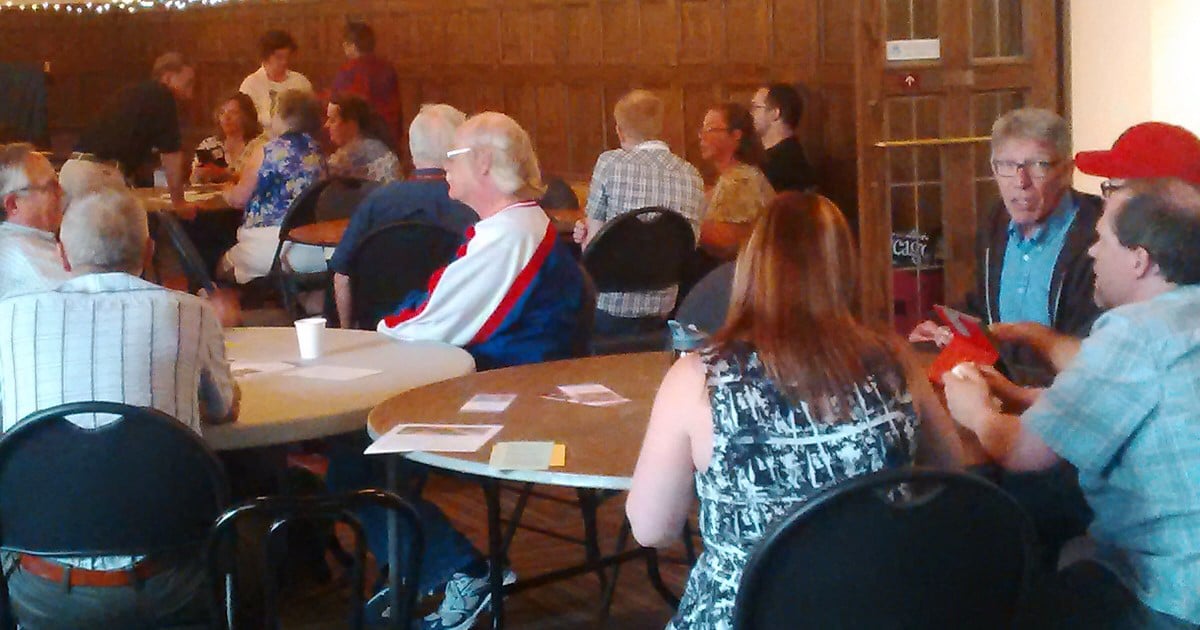The third annual Vital and Healthy Parishes consultation saw a record turnout, as 79 Anglican and Lutheran church leaders gathered at the Canadian Mennonite University in Winnipeg from June 6-8 for discussion on how to build strong missional congregations.
The Rev. Dr. Eileen Scully, director of Faith, Worship, and Ministry and a key organizer, described the consultations as embodying the idea of the church as a community of mutual learning.
“The most important thing that [Vital and Healthy Parishes] has done is bring together people who would not normally be in conversation with each other,” she said, noting that the 2016 consultation saw more diverse participants with an increased presence of young and Indigenous church leaders.
‘There is a deep value in sharing our stories’
The heart of Vital and Healthy Parishes lies in its open space “marketplace” format, in which participants create discussions based on their respective interests.
“I thought the breadth of topics was amazing, ranging from the very practical ‘how to’ sessions to the erudite theology dialogue,” said Canon Christyn Perkons, director of congregational support and development at the Anglican diocese of Niagara.
Canon Perkons previously attended the 2014 consultation. This year, she attended marketplace discussions on the School for Parish Development in the diocese of New Westminster, which she plans to participate in this July, and how social media can be used to support various ministries.
Returning to her diocese, she brings back a renewed sense of solidarity, an appreciation for similarities and differences between Anglican and Lutheran faith communities, and the feeling that her diocese is “not alone in its struggles, nor in its successes”.
“There is a deep value in sharing our stories,” Perkons said. “Shared stories deepen our sense of identity, strengthen our call to be part of the body of Christ, reinvigorate our ability to imagine outside our own boxes, and allow us to ‘see’ a way forward in others’ experience without having to reinvent the wheel.”
The Rev. Dr. Neil Mancor—parish priest at St. George’s Anglican Church in Ste. Anne de Bellevue, Que., located in the diocese of Montreal—attended the first two Vital and Healthy Parishes consultations. At this year’s meeting, he was able to share new insights about organizing a Messy Church program in his parish, which was still in its early stages at the time of last year’s consultation.
An alternative for families unable to attend traditional Sunday worship, Messy Church typically runs one weeknight per month and explores a theme from the Bible through arts, crafts, games, and a celebration through song or prayer.
“We’ve [now] had a year of Messy Church, and so I was able to come with stories, but also questions, because having a successful Messy Church brings a lot of questions with it,” Mancor said.
“It was great to talk to people from across the country and hear a bit about what other people were doing.”
Mancor also gained insight into ministry among First Nations communities in Alberta and Saskatchewan, and participated in a discussion exploring the Godly Play approach to Sunday school.
Newcomers reflect on experiences
The consultation left a positive impression on many participants who were attending Vital and Healthy Parishes for the first time.
The Rev. Norm Wesley, incumbent at St. Thomas Church in Moose Factory, Man. and Church of the Apostles in Moosonee, said the event exceeded his expectations due to the sheer variety of topics—highlighting a session on the use of music in parishes in particular.
“I would go again if I was asked … You get that chance to have this free-flowing discussion with your peers, with others within the church, with your brothers and sisters in Christ, at a very, very level playing field,” Wesley said.
“That I found to be very, very engaging and very interesting and a very good use of my time when I was there. I really enjoyed it.”
Leslie Giddings, child, youth, and adult learning facilitator for the Anglican diocese of Ottawa, praised the idea of a learning model in which “all the wisdom is in the room” and conveyed through discussion.
“The meaning comes out of the relationships that you develop in hearing the stories,” Giddings said. “I’m not sure it would have felt as meaningful if we’d just been hearing presentations.”
Douglas Doak, executive officer for the Anglican diocese of the Arctic, attended a discussion convened by sociologist Joel Thiessen and theologian Bill McAlpine on their project to gain insight into features shared by flourishing congregations. He left impressed by their high level of research.
“I just took away the value of a sustained examination of any topic—fieldwork, reflective thought on the fieldwork, and the conclusions that they drew from it,” Doak said. “We’ll be staying in touch with that project and hoping to benefit from it.”
Future plans
Thus far, Vital and Healthy Parishes has been supported with a grant from the Ministry Investment Fund, which has now run its course. Yet such has been the degree of positive feedback that Faith, Worship, and Ministry now plans to integrate the program into its core ministries.
“It’s become that important,” Scully said, noting, “The feedback that we have gotten consistently is that it needs to continue.”
As an example of the potential of the Vital and Healthy Parishes learning model, she pointed to the creation of new liturgical texts in recent years, and the attendant need to form good liturgical leaders.
“There are all kinds of things that I see this model being able to be adapted for, and it’s exciting.”
Interested in keeping up-to-date on news, opinion, events and resources from the Anglican Church of Canada? Sign up for our email alerts .

